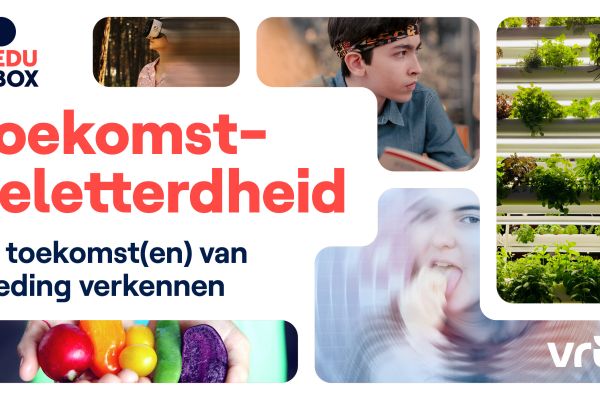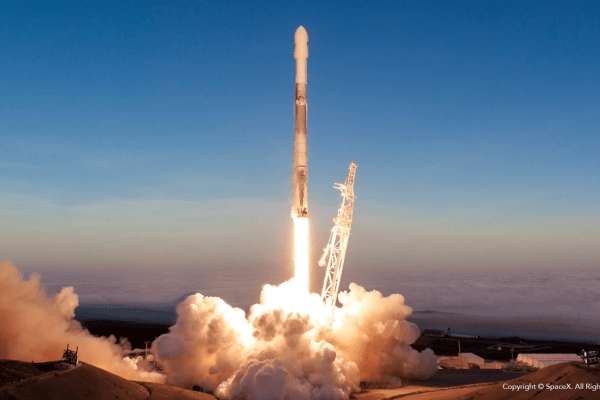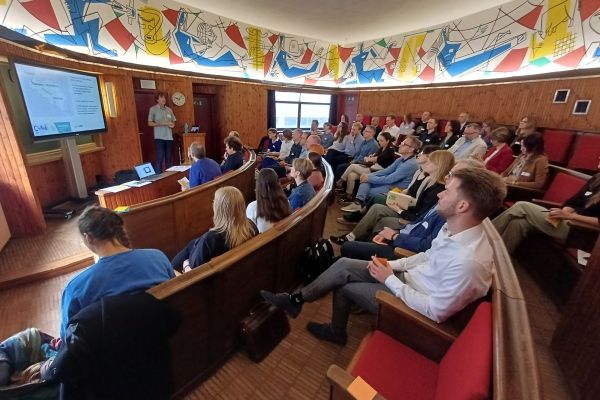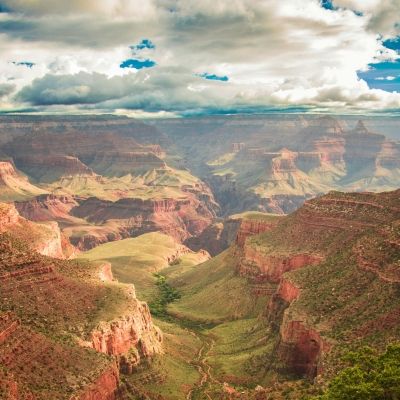Hit the road with climate support
Cultivating more climate-friendly and robust crops: there is a whole arsenal of measures that farmers can implement themselves. But uncertainty over their impact on daily operations and on economic business results often still holds them back. The KLIMREK project changed that, with climate support tailored to individual Flemish agricultural firms. Through its Remote Sensing department, VITO provided the ‘geo component’, which meant that satellite and drone imagery could also be used for monitoring the participating farmers’ fields. With geo-agricultural tools such as WatchITgrow and WaterRadar, climate consultants and farmers can choose and monitor the right measures more smoothly.
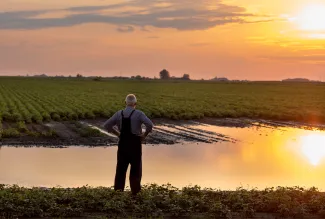
Agriculture that is better for the climate and is also more resistant to the consequences of climate change, such as extreme weather. Few would still doubt the need for it, but how do you get started with that as a farmer? ‘There is a whole arsenal of measures for making agricultural firms more climate-friendly and robust,’ says Anne Gobin from VITO. ‘Consider crop diversification, alternating between pre-crops, intermediary crops and post-crops, extra soil care through soil covering or nutrient management, field edging with strips of grass or hedgerows, forest agriculture, retaining water for longer, etc.’ But a particular measure will have a larger impact for one farmer than for another. After all, every agricultural firm is unique, owing to the specific geography (including soil, water and landscape type), activity, extent and operations.
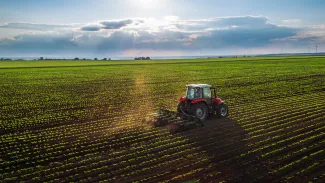
Climate scan
Instead of carrying out hit-or-miss climate measures, a farmer would be well-advised to investigate his company in climate terms first. That way, a climate consultant can discover along with the farmer which options are beneficial, as well as what impact they may have on economic business results. Such an investigation – a ‘climate scan’ – came at the start of the process followed by farmers participating in the Flemish KLIMREK project, which has just closed and ran from September 2019 to September 2023. In this agricultural project, supported by VLAIO, the participating farmers were closely followed in their business-specific process, from the initial climate scan to the climate course where climate consultants evaluated the impacts of the climate measures implemented along with the farmer. Anyone with an interest in agriculture in Flanders can now learn some lessons on how the sector can operate in a more climate-friendly way. The project was carried out by ILVO (coordinator), Boerenbond and VITO.
KLIMREK, which stands for ‘climate measures with economic opportunities for an agricultural firm’ (in Dutch), began four years ago with fifteen agricultural firms, spread all across Flanders and belonging to one of these three sectors: dairy farming, pig farming and arable farming. As the project progressed, more firms were able to join up.
Everything began with developing the climate scan, where climate consultants from Boerenbond and researchers from ILVO visited the participating farmers to gather data specific to their firm. This was then processed into a life cycle analysis per firm, and partly based on this, an investigation was made for each agricultural firm and a package of climate measures was put together, along with an accompanying cost-benefit analysis.
For the data collection, the consultants also called upon VITO, which has a lot of experience in supporting farmers based on remote sensing. ‘Within the project area for arable farming, we were responsible for the “geo component”, which means the spatial information’, Gobin explains. ‘That was where the real added value in our involvement was to be found.’ VITO’s Remote Sensing department used a range of types of remote sensing data, such as satellite and drone imagery, to monitor several characteristics of the fields, for example crop growth and drought. The climate consultants and farmers can consult the data through WatchITgrow, the online tool that VITO developed for arable farmers to better monitor their production and improve it in a sustainable way. This was how VITO helped the farmers in the later phases of the KLIMREK project too, in proposing some potential climate measures.

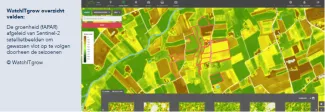
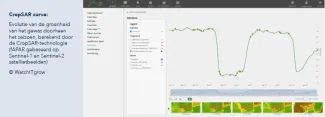
No more crisis management
The geo component that VITO provided within KLIMREK exceeded the level of individual fields or agricultural plots. The agricultural firms were also examined in their broader geographical context. For example, the availability of water was identified for irrigation. Here too, the farmers were able to call upon an online tool developed by VITO. WaterRadar shows what alternative water sources are available in their surroundings. These could be reservoirs of purified sewage water, but equally reservoirs opened up by companies such as the Leuven beer brewery AB Inbev or the West Flanders frozen vegetable manufacturer Ardo.
Partly thanks to remote sensing data, farmers can keep their finger on the pulse of their operations far better. This allows them to respond better and more rapidly to upcoming changes, and ideally they will no longer need to shift towards crisis management as a result. One example of such a crisis is long-term drought, leading to a water shortage. Farmers can arm themselves against this with a range of measures. They can retain water in wetter periods, for example by placing partitions in adjacent canals or through level-controlled drainage of their fields – a suitability map for level-controlled drainage can be consulted through WaterRadar. Or they can construct water reservoirs themselves by collecting rainwater, for example. These kinds of climate measures were also addressed in KLIMREK.
What was notable during the project? ‘It surprised us to see how firm-specific climate measures actually are,’ says Gobin. ‘That means what works for one farmer won’t work yet for another, even though their operations are highly similar. Of course, this is a feature of Flemish agriculture. Although we’re a small region, we have a large diversity of soils, landscapes and agricultural activities.’ All the more reason to go for an approach tailored to individual firms. And that’s how more climate-friendly and robust agriculture begins – in close collaboration with the agricultural firm – where the focus lies on the combination of firm-specific characteristics, data and technology.




